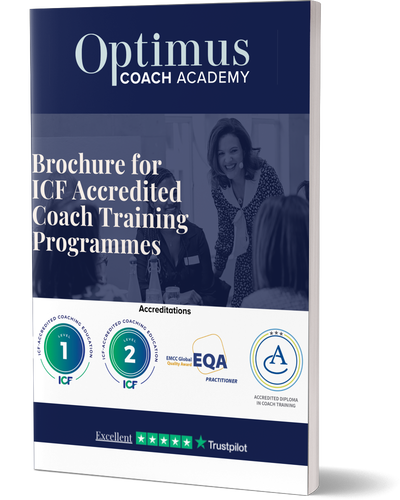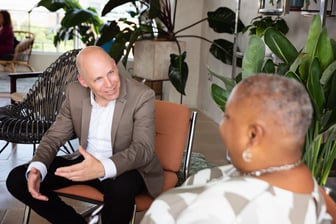Exploring The Client's Context
Coaching context describes the specific environment, circumstances, and objectives surrounding a coaching interaction or relationship. Context can vary widely depending on the nature of the coaching, who is involved and what the goals are.
This can include the "type" of coaching as this may influence how the client perceives you as a coach and what they believe they can bring to coaching. At Optimus we promote the whole person, holistic approach however we may modify the elements depending on who we're coaching and how we've contracted.
The coaching setting can also impact the coaching relationship for example whether it's organisational or personal, in person or online. For all settings understanding more about the context can support you to help your clients identify what they can do for example in a workplace with a traditional structure there may be less scope for influence by a leader than in a flatter less hierarchical structure. This context will impact the clients thinking and decision making.
Equally, the cultural background of the coach and the client and the systems in which they operate can impact the coaching relationship. This is why it's so important as coaches to do your own work so you can be aware of any biases, assumptions and biases you bring to the coaching relationship which may impact how you show up and support your clients.
Finally, client context may dictate the approach that you use. For some clients especially at the start of the relationship a more transactional approach may be most effective using coaching models to build trust and safety before going deeper with the clients.
- Context often links into identity : understanding the way our clients perceive the systems that they operate in can help them look at how they want to be in these systems
- The environment which a client is in can impact their brain and body (nervous system) therefore exploring this can be useful in coaching effectiveness and may mean having coaching sessions in different locations e.g. out of the office or house
- As a coach you need to appreciate the impact of your clients context on their ability to move forward and recognise that your clients progress may be different to how you make progress. It's recommended you check in with your clients to see how they feel about the sessions and the progress they are making.
- As a coach you're non judgemental and need to be sensitive to clients’ identity, environment, experiences, values and beliefs
Understanding both your own and your clients context is a theme which runs throughout the course including in Module 1 and Module 4 Coaching Psychology as well as Neuroscience. We provide additional training around context including exploring diversity and inclusion so you can create spaces which are inclusive and supportive to all clients.
Are you wondering how this can show up in a coaching session? We share some examples below which can give you clarity on how you can apply this concept to real life coaching scenarios.
Why It’s Important: Goals that are set without considering a client’s context may be unrealistic or irrelevant. Understanding the client’s life situation—such as their career, family, financial situation, or health—ensures that the goals are achievable and aligned with their present circumstances.
Example: A client may express a desire to advance in their career by taking on a leadership role. However, if the client is currently juggling multiple responsibilities, such as caring for young children or managing a demanding job, a coach should be aware of these factors. The coach could ask, “Given your current responsibilities, how do you feel about taking on additional leadership tasks?" or " What do you feel is achievable right now?" or "What support do you need to be successful in this new role" . As a coach you're supporting your client to explore what can work for them within the context they are currently operating in.
Why It’s Important: The client’s environment, relationships, and external pressures can greatly impact their behaviour, decisions, and mindset. Recognizing these factors allows the coach to offer solutions that are more practical and effective in helping the client overcome obstacles.
Example: A client may be struggling with motivation to pursue personal goals due to pressure from a toxic work environment. The coach might ask, “It sounds like the stress at work is affecting your motivation, what do you think?" or "How is the work environment impacting you achieving your goals?" or "What else is going on?" These questions can help the client to explore the impact of their context on their goals and support them to consider solutions based on their situation.
Click on the buttons below to understand the importance of the other pillars we teach within our Optimus Holistic Coaching Framework.
Download Our Latest Brochure To Find Out How We Integrate Our Holistic Coaching Approach In Our Triple Accredited Diplomas

-
Benefit 1
You will better understand what it is like to study on either of our Accredited Diplomas with Video testimonials included
-
Benefit 2
A detailed breakdown of the different modules taught in both our ICF Accredited Diplomas.
-
Benefit 3
Find out course dates and meet members of the Optimus team
To find out more about we integrate our Holistic Coaching Framework into our Accredited Diplomas click the appropriate link below

Are you interested in training to be an accredited coach ?

Are you in a leadership role looking to develop coaching skills?

Are you an existing coach looking for formal certification?
